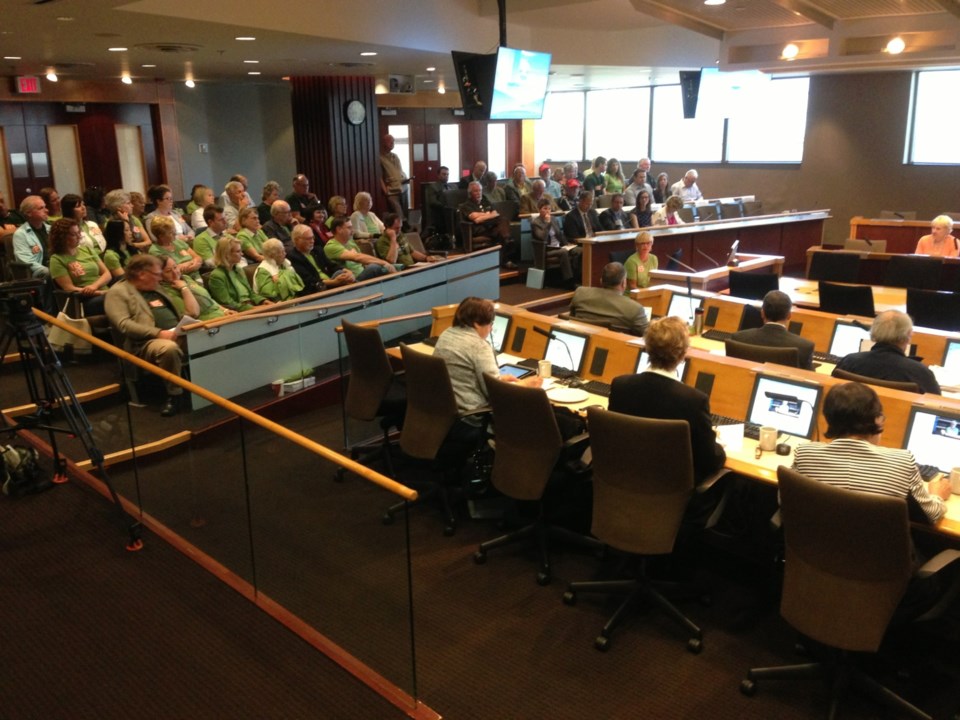The Metro Vancouver public hearing on the Southlands development proposal concluded Thursday afternoon.
Supporters and opponents jammed a public hearing in Burnaby hoping to convince regional directors the plan for the 214-hectare (537-acre) Tsawwassen property is either innovate and positive or one that should be shelved because it fails to comply with the Regional Growth Strategy.
The directors. including mayor Lois Jackson, heard from 73 speakers during the session. The majority of the first 50 or so spoke in favour but were outnumbred after that by opponents of the plan.
Green T-shirt-clad supporters of the Century Group proposal arrived in Burnaby early, claiming most of the seats in the chamber and the initial slots on the speakers list. The crowd was so large many were forced to watch the proceedings on closed circuit TV.
Brent Kelly, who is currently farming the land, was the first speaker and described major irrigation problems, including losing $75,000 due to heavy rain.
"While the ducks and the geese are very happy swimming around and eating the potatoes, my banker is not," Kelly said. "Please remember it's not our responsibility to feed the public's ducks and geese."
Southlands the Facts spokesperson Richard Kunz was one of the few opponents to address the Metro board early on, warning directors that approving the application would unleash an unprecedented land grab by speculators and developers.
Century Group is proposing to build 950 housing units on 20 per cent of the site, while 80 per cent would be given to Delta. Much of the land to go to the municipality would be used for farming, the company promising to pay millions for drainage and irrigation upgrades.
The latest plan has many opponents who made their feelings known at a five-day municipal public hearing last fall, but it also has many supporters, making it an issue that has divided the community. The proposal received conditional approval from Delta council but Metro's blessing is also required.
Opponents warn of a dangerous precedent being set if farmland is acquired in exchange for other agricultural land being paved over. Supporters insist the property has always been a challenge to farm and that the Century plan would finally bring the land into production.
If there were still speakers to be heard at the end of yesterday's session, the hearing was scheduled to reconvene today at 1 p.m.
Years in the making, it could be the final stretch toward approval or a dead-end for the proponent.
It's been exactly 25 years since the municipal public hearing began on the contentious Tsawwassen Development Lands housing proposal for the Southlands property, becoming the longest public hearing in Canadian history. At that time, an overwhelming number of the speakers were opposed. That hearing was eventually halted and council rejected the plan.
Not long afterward, Century Group purchased the Tsawwassen site, but it would take another couple of decades before a formal development application was submitted and considered. Following concepts of new urbanism and agricultural urbanism, Century Group's plans, which went through a few twists and turns of its own before ending up at the regional district, is much different than the TDL scheme.
According to Century Group, the Southlands neighborhood would be "carefully designed to be a walkable, sustainable, mixed-use community that naturally and intentionally integrates with a community farm. A diverse range of housing options will be available, from small cottages to live-work studios, the new housing will create an interesting, thriving and unique place to live and work."
Urging residents to attend, the citizens' group Southlands the Facts recommend people voice their opposition based on the planning principles in the region's growth strategy, including, for example, the plan not providing affordable housing.
The region received about 500 written submissions. Although oral submisssions will no longer be heard, written submisssions will be accepted until May 9.



